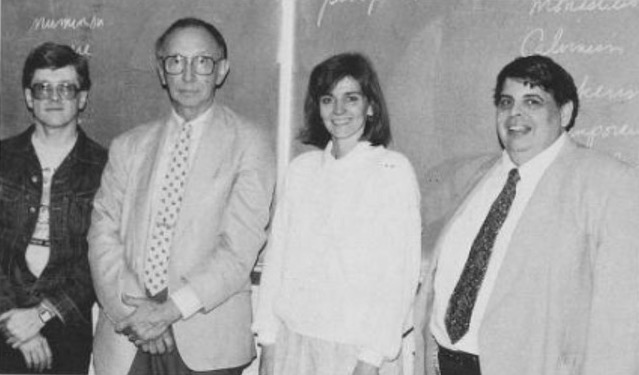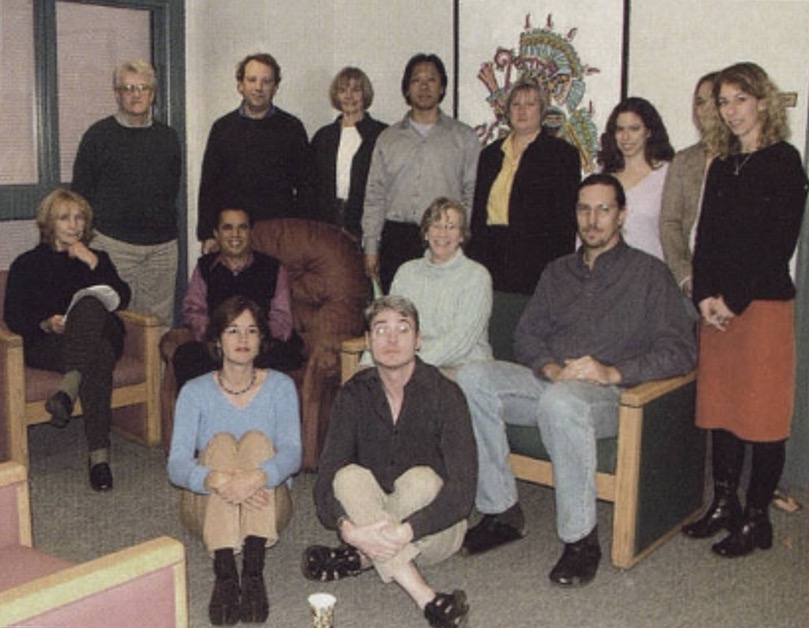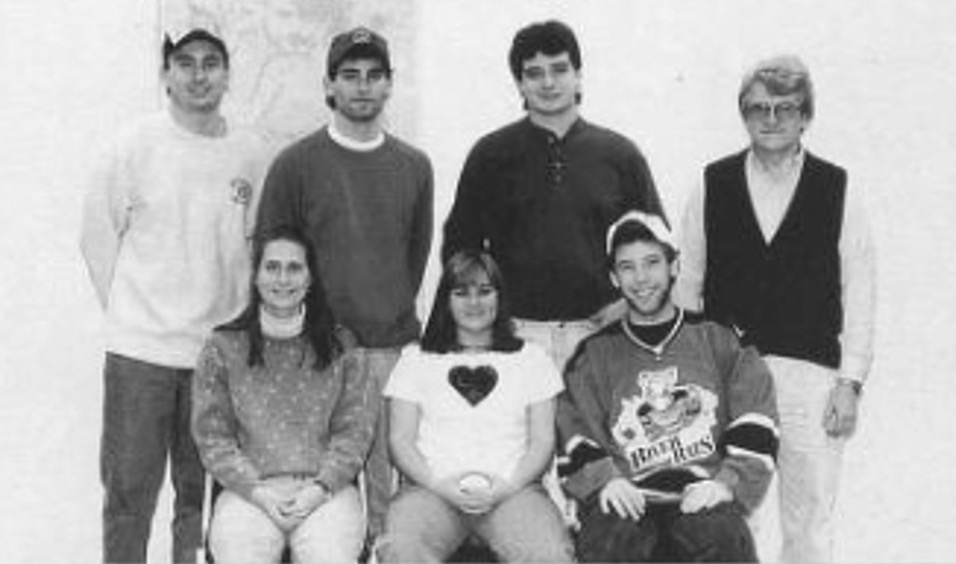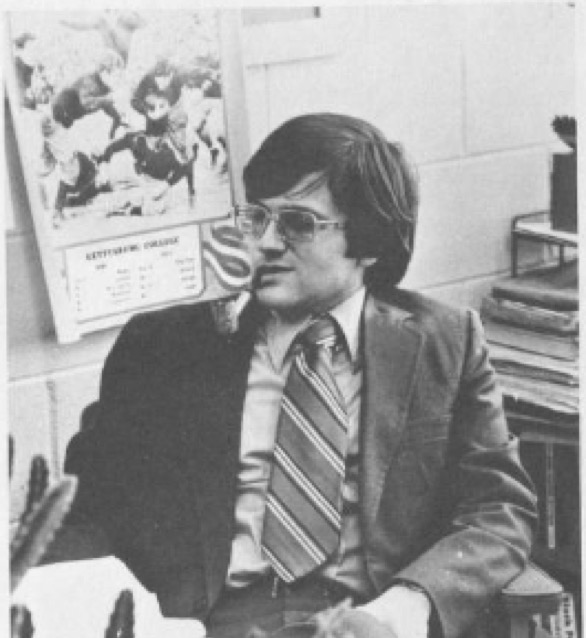By Phoebe Doscher, News Editor
“I always just went where my interests were, I didn’t worry too much about what the mainstream thought.” These are words that lifelong learner and longtime teacher Charles Emmons, Professor of Sociology at Gettysburg, lives by. The former advisor of WZBT, a position he held for 26 years, retires this semester after 46 years teaching at Gettysburg and pursuing unconventional studies, from UFOs to popular culture.
As soon as he could start learning and teaching, he did. Emmons proudly deduced that he has been either a student or a teacher for 72 years straight, and now he enters his retirement after teaching at Gettysburg since 1974, where he has even tried other classes himself while working as a professor. But, at first, teaching was not his intended path.
“Very briefly, I had a bank job and I found out that wasn’t for me. I don’t want to have a real job. I’d rather be a student forever,” he explained. “I’ve always been really focused on being a student. And so it seemed like the logical thing was just to keep on going to school and be a part of college teaching.”
At first an aspiring classical archaeologist, Emmons studied anthropology at Gannon University, learning six languages along the way and working on the staff at New York University’s Excavations at Aphrodisias Turkey where he took inscriptions in Greek and Latin.
“As Charlie admits, he’s kind of a language addict, meaning he has an almost unquenchable thirst for learning new languages, teaching them, and studying language and how it’s used in particular communities,” Sociology Department Chair Craig Lair said during Emmons’s valedictory speech at a recent faculty meeting.
After receiving his master’s degree in anthropology from the University of Illinois, Emmons taught Greek and Latin for a year at Gannon in his hometown of Erie, Pennsylvania. He taught anthropology at Loyola University and planned to pursue a PhD in the field before his plans took an unexpected turn and a doctorate in sociology became the most logical choice.
“It was fun, you know, just to learn something new,” Emmons spoke of the impromptu decision to pursue sociology. “I just went ahead and did a new field.”
Within two years, Emmons received a PhD in sociology from the University of Illinois Chicago by the time he was 28 years old.
“That’s sort of a world record,” he said, chuckling. “I know other people who’ve gotten a PhD in two years too, but it’s pretty unusual.”
“I always just went where my interests were, I didn’t worry too much about what the mainstream thought.” – Charlie Emmons
Emmons taught sociology at Eastern Kentucky University for three years before coming to Gettysburg to join what was then the Department of Anthropology and Sociology and has since been separated into two. In the end, his experience with anthropology combined well with the discipline of sociology.
“Sociologists can study anything. I mean, similar to anthropologists, have a wide range of ways of looking at human societies,” said Emmons. “I also have a master’s in anthropology and I used to teach anthropology so I love that.”
Emmons stayed true to the notion of studying “anything” during his tenure in the sociology department at Gettysburg. At a time when the subject was not taken seriously, he specialized in mass media and popular culture in the 80s after being exposed to popular music at the radio station. He then geared up for a career studying niche topics and facing criticism.
“I’ve had ridicule from faculty,” he continued. “But it’s not so bad that it’s really a problem. I did enough mainstream things that I managed to get tenure.”

Emmons (far left) with fellow faculty in the departments of anthropology and sociology (Photo courtesy of Spectrum Yearbook)
A study of Hong Kong politics in 1987 fell under the realm of Emmons’s mainstream scholarly works. His most recent publication, however, delves more into the taboo; he and his wife Penelope—a spirit medium herself—co-authored the 2012 book Science and Spirit: Exploring the Limits of Consciousness.
“You know, pop culture seems trivial, but it’s really not. And then you could say studying ghosts and spirit mediums is trivial. But it’s not, because who doesn’t wonder about what happens after you die? I don’t think that’s a trivial subject,” he said.
Emmons is particularly interested in the connections between paranormal experiences like sightings of ghosts and UFOs. He made an appearance in the documentary “Ghosts of Gettysburg,” and other publications of his include At the Threshold: UFOs, Science and the New Age; Hong Kong Prepares for 1997; and Chinese Ghosts and ESP: A Study of Paranormal Beliefs and Experiences. He also made three films himself, all available on the Cupola: “Drum Dreams: Drum Circles in North America,” “Roll Your Own Religion: New Spirituality in North America,” and “Science and Spirit(s).”
Some people, he shared, are more prone to paranormal encounters than others, and this link opens up the possibility for interconnected studies in spirituality, psychology, religion, and medicine.
“Mainstream science is reluctant to accept any of these things, but there are serious scientists who are studying them,” he said. “And they are really beginning to see the interconnections all these things.”
“In a couple hundred years this is something that people will say, ‘Well, why didn’t we know this before?’ And there’ll be no good excuse,” Emmons continued. “Well, there are breakthroughs being made, but there’s still a lot we don’t know.”
Over the years, Emmons has learned to be sensitive to subject matter involving spirituality and the paranormal. He continued to follow his interests, defying mainstream thought, but cautions those engaging with topics like extrasensory perception (ESP) or related subjects.
“I have learned that you have to gauge your audience. Some people are just not ever gonna be interested in talking about this,” he said. “Almost everybody has to have their own experience to accept this, because it’s not generally considered legitimate.”

Emmons (standing far left) posing with colleagues in sociology and anthropology (Photo courtesy of Spectrum Yearbook)
Throughout the years, Emmons has brought these studies into the classroom by doing hands-on healing, ESP games, and teaching spirit mediumship with his wife. While he never expects students to believe anything, and always offers alternative options for assignments—which nobody, in fact, has ever opted for—he allows them to try and potentially pique their interests.
“When people actually encounter these things, they often find something that they’re interested in. And that the experience is more important than the belief. So they can just try it out and see what happens and they get intrigued,” Emmons said.
Some of his in-class meditation or healing activities have garnered positive responses from students; one such student emailed him to share that her chronic ear pain was healed after a class with his wife, and she was later inspired to open a healing spa herself. Another student told Emmons that the meditation practices in his class prevented them from dropping out of school.
“I mean, people would disagree, which is fine,” he said. “Sometimes they’d laugh, you know, giggle or something. Or say they’re not getting anything. But nobody said they wouldn’t try it. And that’s all I ask people to do is just give it a try.”
“You could say studying ghosts and spirit mediums is trivial. But it’s not, because who doesn’t wonder about what happens after you die?” – Charlie Emmons
Emmons has made connections with generations of students at Gettysburg, including former Gettysburg President Janet Morgan Riggs ‘77. Students past and present have been touched by Emmons’s dedication and open-mindedness as a teacher.
“Professor Emmons was not shy to be himself in and out of the classroom, always going through life balancing a free-spirited and thoughtful outlook on the world,” Emily Wielk ‘20 said. “[He] will be truly missed in the sociology department and his unique teaching style has surely left a mark on numerous students, myself included in his extensive teaching career.”
Meira Ruben ’20, a student in Emmons’s senior capstone, recalls fond memories in the classroom where he provided practical approaches to sociological studies, brought in a lava lamp to demonstrate Chaos Theory, and held a party at the end of the semester for his capstone students. She was touched by the care he took to teach and make a meaningful impact on his students.
“Inside and outside of the classroom, Professor Emmons shows creativity, generosity, and kindness in all that he does,” Ruben said. “His easy-going and encouraging outlook on life serves as a reminder to us all to have fun with what we do and see the good in the learning experience.”
Another way Emmons feels he has made an impact on students is through his work with the radio station for 26 years. In 1975, students approached him asking if he could work as the advisor and station administrator for WZBT, and despite knowing nothing about radio, Emmons became deeply involved. He started his own radio show, attended all the meetings, and developed an interest in new genres to him, like punk rock. But, his favorite part of the experience was his connection with the students.
“Seeing students really take off and and learn how to be leaders and, and how to do a good radio show—that was that was pretty exciting,” he said. “I had the closest relationships with the students at the radio station, then of course, some of those people were also sociology majors, so that kind of doubled up the connection.”

Emmons (far right) with the students he advised for the radio station, WZBT (Photo courtesy of Spectrum Yearbook)
Along with his work at the radio station, Emmons considers his contribution to the Gettysburg curriculum one of the biggest contributions he’s made to the college. He convinced the administration to include what is now known as the Cultural Diversity Requirement in the curriculum.
“I looked through the transcript of every graduating senior and found out whether they’d had a course that was cross cultural, and how many classes there are, and would there be enough room for people in those classes,” Emmons said, noting that these actions occurred before the course system was computerized. “And I did my feasibility study to convince people that it was practical and it passed even though the Dean was against it. So that was my big political victory.”
Through his experience teaching at other institutions, Emmons has learned that he appreciates the cross-disciplinary nature of a liberal arts institution that has allowed him to work on differing research projects and continue studies in classics, sociology, and anthropology.
“I know I like liberal arts environment better than a university environment. If I were at a top university, I would learn more and more about less and less. And so I would rather be cross disciplinary,” he said. “I don’t like repetition very much. I want new things all the time”
“Professor Emmons will truly be missed in the sociology department and his unique teaching style has surely left a mark on numerous students.” – Emily Wielk ’20
The interpersonal connections he has developed at Gettysburg are the part of the experience that Emmons will miss most—whether that be talking to those next door to his office, the housekeeping department, the dining hall staff, and discussing sports with fellow professors.
“When I started in the fall of 2014, Charlie often stopped by my office (saying “knock, knock” without ever knocking) to tell me how many days there were until the end of the semester, talk about Indiana and Illinois college sports teams, or discuss challenges faced by students that we had in common,” Sociology Professor Brent Harger said. “These visits helped me feel welcome here, especially since the two offices next to mine were empty due to faculty research leaves.”
As a result of Gettysburg’s transition to remote learning, Emmons had to clear out of his office in Glatfelter—which was previously occupied by President Eisenhower—earlier than he anticipated.
“I joked that I got through 103 and a half semesters of college teaching without having to teach online. And the universe pointed to me and said, ‘not so fast.’”
Although Emmons’s time as a teacher is coming to an end, he has no intention of putting his love for learning to rest. He plans to learn to read Chinese—with a goal of being able to read the newspaper in Chinese by age 95—and return to playing the cello, which he played with the Gettysburg College community orchestra for a semester.
“I finally figured out I like being a student better than I like being a teacher” he said. “So now I’ll be able to just read whatever I want. You know, I won’t have to worry about grading papers or anything or taking tests even. Just study what I want […] you know, just doing whatever is fun for me.”



May 12, 2020
My then girlfriend and now wife and I took Dr. Emmon’s Sociology class in 1974; didn’t realize it was his first year! One of my favorite classes of all 4 years, much of what i learned I was able to apply throughout my career in business consulting. My clearest memory is when he shared work studying traffic patterns in the circle in the town square — who would yield and who wouldn’t. I think about it a lot when in NJ, where they love circles!
May 12, 2020
I’ve known Charlie Emmons since he came to Gettysburg, and we have continued our relationship after I retired in 2017. He has one important quality which is not noted in the article [not surprisingly, as he is very modest]: he is one of the [few] straight shooters. He is very honest and open to sharing his views with anyone, which probably makes him the superb teacher he is, and he does so in a way that makes the recipient[s] of his wisdom feel engaged in a joint search for greater understanding. He also has a wicked sense of humor!
August 25, 2021
I took 3 classes with Charlie Emmons – one of which was Science, Knowledge and the New Age. That class ended up as the foundation for my work as a meditation teacher. Grateful every day for that class. Doing pendulum work with Penelope and Charlie and practicing hands on healing was AWESOME.